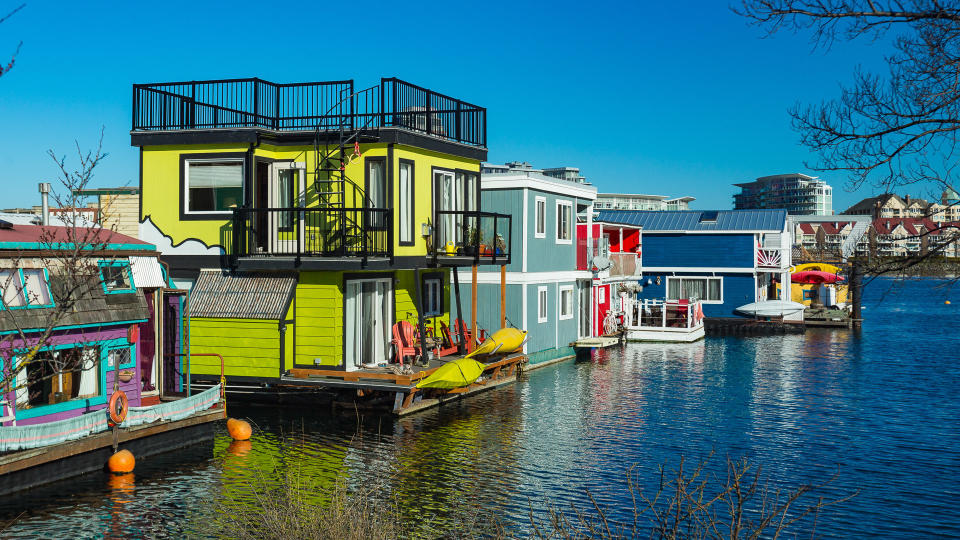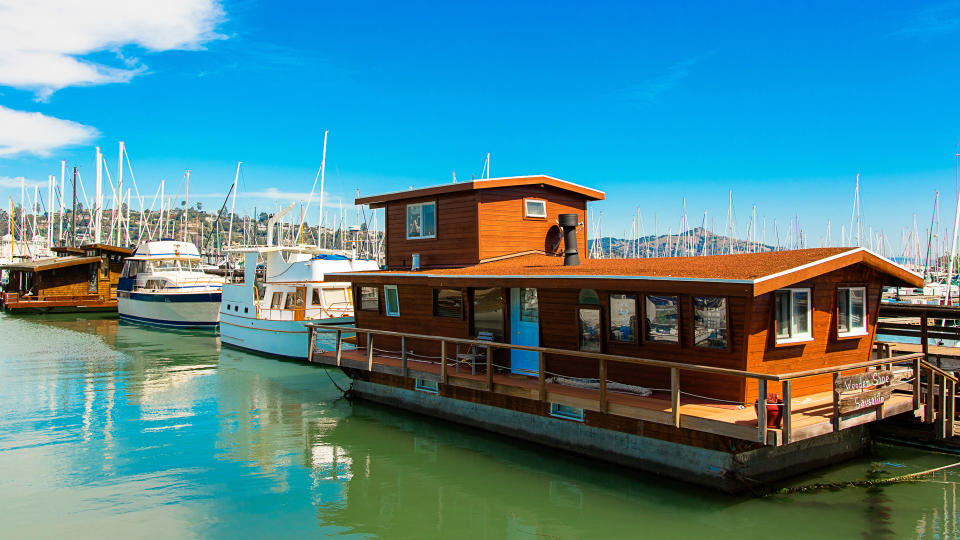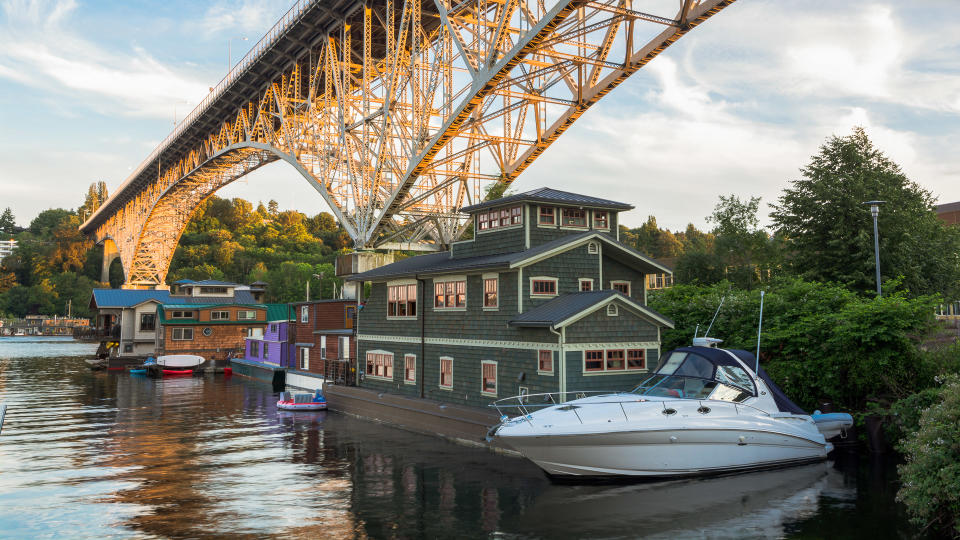When a Houseboat Is the Best Real Estate Investment You Should Make

The current state of the urban real estate market in America’s biggest cities is a rough one, to say the least. If you’re living in places like New York, San Francisco, Los Angeles or Seattle, you know that the cost of a basic home is way, way out of reach for the vast majority of people living in the city.
As such, you have a lot of people who are looking to buck the typical approach to homebuying in favor of unconventional solutions that will allow them to continue living in the city — without the sacrifice of an impossible commute or an overpriced, undersized apartment.
One of those unique solutions that at least some urbanites are pursuing is a houseboat or floating home. And while a floating home is rarely, if ever, going to be a sound investment in the way purchasing a home (usually) is, there are certain circumstances where it can end up being a smart financial decision in addition by allowing you to make your urban lifestyle significantly more affordable.
A Houseboat Won’t Appreciate Like a Normal Home
The single most important thing to understand about a floating home or houseboat as opposed to a normal house is that your floating home is going to depreciate. From an investment perspective, this is hard to get around. One of the major perks to buying a regular home is that you’re getting a major asset in the process, one that will (knock on wood) gradually add value over time even while it’s also fulfilling your housing needs.
Floating homes, unfortunately, won’t do that. In addition to an array of maintenance costs, you can also expect the resale value of that home to inch down year after year once the wear and tear of living on the water slowly devalues the asset. Despite this, there are some very specific circumstances where a floating home might actually be the smart financial decision for your lifestyle.
You Can Find the Right Houseboat for Sale

The cost of living on a houseboat can range considerably, and much like any other decision you’re going to make with housing, you have to find the right place for both your budget and your lifestyle. You shouldn’t consider options that go above and beyond what you can actually afford. You need to also think seriously about how less living space will affect you, as you’re more than likely going to have to accept something smaller. A floating home might be a quaint, cozy little home for you and your spouse only to become painfully claustrophobic after you add a child or two.
What’s more, a floating home has the additional issue of needing a place to moor it. You need to make sure that you don’t just have the right houseboat or floating home, you need to be sure you have the right place to dock on a long-term basis.
Check Out: Best Investments for People Over 50
You Live In the City
Living on a floating home or houseboat has plenty of its own advantages, from increased mobility to the relative tranquility of living on the water. None of them are financial, though. In order to make a case for a houseboat as an investment, you would have to be working and living in a very dense, urban environment where the cost of renting an apartment — let alone buying a home — is prohibitively high. Unless you’re escaping higher prices elsewhere, living in a floating home might be fun, but you’re paying a price. As they say, it’s all about location, location, location…
You Live In the Right City

Of course, from a financial perspective, you can’t make the case for a floating home in just any city. You also need a city with waterways that move close to the city center or where you work. Or, one that offers the opportunity for a manageable ferry ride from your mooring to the area you work in.
In addition, you’ll also need to consider a city with ample mass transit as owning and parking a car might be more difficult. However, if you can live near transit hubs as well as amenities that are important to you, this decision could make more sense for you.
When the Rent Is ‘Moor’ Than You Can Stand
Most urban dwellers aren’t homeowners — in many cases, they’re renting apartments that cost them more than mortgages would outside the city. There, the equation changes as you’re not receiving any equity in exchange for your rent, just like your floating home.
That doesn’t mean that you can simply skip out on rent by living in a floating home on a waterway in the city. You will still owe some form of mooring fees for the right to dock your home. This is one area where it’s important to understand the difference between a houseboat and a floating home. A houseboat is a boat you can live on, meaning it’s self-propelled. If you have some sort of disagreement over mooring fees, you can pick up and move pretty easily. A floating home, however, is more of a home on the water. You have permanent plumbing and electricity hookups, and there’s no engine. If you need to switch moorings for whatever reason, moving a floating home is possible, but extremely costly and difficult. So, if you’re getting a floating home, choosing where you’re docked is all the more important.
That said, you can probably crunch the numbers on costs to figure out what sort of price you need to get before you might be saving money over your apartment. Accountants will often calculate the annual rate at which an asset depreciates so that you can balance costs over time. For a floating home, work out the estimated cost of mooring fees, maintenance and the depreciation of the actual home (which is, notably, tax deductible if you itemize) into one monthly payment. You can then compare that payment to what you would be paying for rent in the same area or one similar — including factoring in the rate at which rents are rising/falling. This can give you a clearer picture of how the long-term costs of a floating home compare to renting.
Your Commute Is Killing You
One other factor you might want to fold into those calculations is your commute. If you’re shaving an hour each way off of the time it takes to get to work by living in a slip near your job or taking a ferry, that translates to 10 hours a week in time you’re getting back. Assuming you make $20 an hour, that’s equivalent to $10,400 a year in lost wages before taxes.
It’s also worth noting that the cost of a bad commute to your health — mental and otherwise — is incalculable. You simply can’t place a price on your sanity and happiness. Though, you should try for the purposes of working out if a floating home is right for you. A few extra thousand dollars a year in housing costs might be well worth it if you’re living a happier, healthier life as a result.
You’re Investing Elsewhere
If you aren’t investing in a home as an asset to later leverage when you need to make a major purchase or move, you should be sure to make up for that elsewhere. Clearly, setting aside as much as you can afford to invest for the long term is a pretty smart move, but for many American families, part of what they’re counting on is their home.
With your houseboat, you’ve made a major capital investment that is depreciating, so you should make a point of counterbalancing that with a diverse, healthy investment portfolio that will help you stay on firm financial footing.
You’ve Really, Really Done Your Research
More than anything else, it’s important to understand that buying a floating home isn’t the right choice for most people. In fact, it’s not the right financial choice for almost everyone. If you’re looking for reasons to consider getting a floating home or houseboat, they’re more likely to revolve around the lifestyle offered rather than a chance to save or make money over other real estate options.
However, there is a small minority of city dwellers who might be in the unique position to use a floating home to their advantage as a way of escaping a punishing housing market and seriously reducing their commute. Just know that you should be more than diligent in researching your options before you take the plunge. There are many different factors that play into which option will cost you more over time, and you need to know them and carefully do some long term budgeting and financial planning around each scenario before you settle on a final choice.
Keep reading to see 11 signs your bargain home is going to cost you.
More on Investing and Real Estate
Find Out What Your Home Is Really Worth — And Why It’s More Than You Think
The Best States to Flip Your Home Are in the East, Study Finds
This article originally appeared on GOBankingRates.com: When a Houseboat Is the Best Real Estate Investment You Should Make

